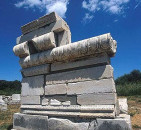The Heraion of Samos was a large sanctuary to the goddess Hera, in the southern region of Samos, Greece, 6 km southwest of the ancient city, in a low, marshy river basin near the sea. The Late Archaic Heraion of Samos was the first of the gigantic free-standing Ionic temples, but its predecessors at this site reached back to the Geometric Period of the 8th century BC, or earlier. The site of temple's ruins, with its sole standing column, was designated a joint UNESCO World Heritage Site, along with the nearby Pythagoreion in 1992.
The core myth at the heart of the cult of Hera at Samos is that of her birth. According to the local tradition, the goddess was born under a lygos tree (Vitex agnus-castus, the "chaste-tree"). At the annual Samian festival called the Toneia, the "binding", the cult image of Hera was ceremonially bound with lygos branches. The tree still featured on the coinage of Samos in Roman times.
- Part of Speech: proper noun
- Industry/Domain: History
- Category: Ancient Greece
Other terms in this blossary
Creator
- KSGRAM
- 100% positive feedback
(Athens, Greece)



